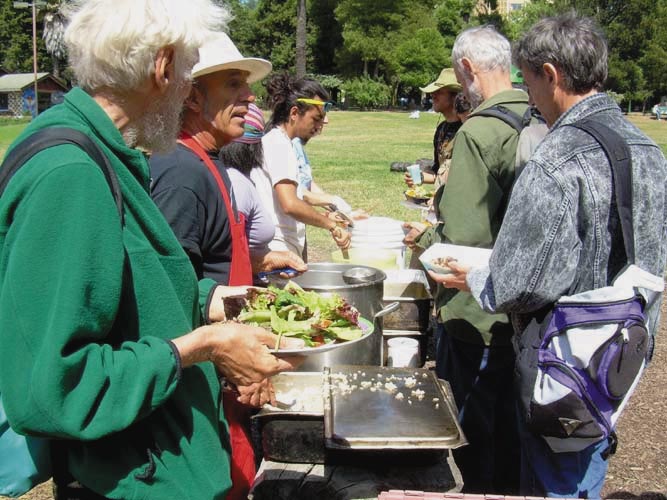
by Lydia Gans
[dropcap]T[/dropcap]he Occupy movement, like other mass expressions of protest, has been plagued by occasional outbursts of violence, Though undoubtedly fueled by provocateurs, the action in itself presents an occasion for people to physically express their anger.
We live in a culture of violence. For some, it becomes natural to lash out against property, even people. Our government, through its overt and covert wars and attacks on other nations, has constantly sent its citizens the message that it’s OK to kill to prove you’re right.
But there are many people and organizations committed to nonviolent political action. Many names come to mind as we search history for examples of nonviolent alternatives to violence and warfare. Mohandas Gandhi spent years in jail, and then gave his very life in nonviolent protest against British colonialism. Martin Luther King, Jr. led courageous activists in marching nonviolently for civil rights.
And today, there are many organizations whose fundamental mission is to carry out peaceful protests — for example, protests against homelessness by occupying empty houses, or against hunger by publicly sharing meals together with people who don’t have access to sufficient nourishing food.
Nonviolence is one of the fundamental principles of Food Not Bombs. In Berkeley, East Bay Food Not Bombs stages a daily protest against a system that values profits more than people and expresses its values in a supremely nonviolent way — by inviting all who come by to share a meal outdoors in Peoples Park. We are making a public statement that food is a human right, not a commodity.
Sharing food is an appropriate way of creating a culture of nonviolence. In the past, it was customary for families to sit down together for the day’s main meal. It was a peaceful time; not a time for arguments, but an occasion to relax from the stress of the outside world. By sharing meals every day, Food Not Bombs is following the same tradition.
If violence erupts, and sometimes it does because poor, hungry and homeless people often are stressed, it is quickly abated. With a plate of food in your hand, it’s easier to find a place on the lawn, the stage or a picnic table, and sit down with friends and chill out. And since the meal is a collective effort, everyone who cares to take part is welcome to help with the serving or come to the kitchens on any day to take part in the meal preparation.
In preparing the daily meals, as in all our activities, we put into practice another of our basic principles: all decisions are made by consensus. All Food Not Bombs groups are run entirely by volunteers who have equal voice in decision-making.
Whether it’s deciding what to cook. or what actions to support, or what events to participate in, decisions are not simply made by majority vote. Everyone has to be in accord — or at least not oppose a given course of action. The same principle holds in our kitchens. There is no boss, so everyone feels equally responsible. Accordingly, people take pride in producing a good meal.
The third basic principle of Food Not Bombs is vegetarianism. Our food reflects our dedication to nonviolence — including violence against animals. Whenever possible, the food we serve is vegan. This also avoids problems with food spoilage which is generally not a problem with plant-based foods. (When we get donations of meat products, we turn them over to soup kitchens that aren’t vegetarian. We believe that eating is more important than being politically pure.)
Food Not Bombs goes back more than 30 years. The first group was organized in Cambridge, Massachusetts, in 1980 by anti-nuclear activists protesting the construction of a nuclear power plant. In 1988, a San Francisco chapter was started and East Bay Food Not Bombs was founded not long after. Today, there are hundreds of Food Not Bombs chapters all over the United States and a thousand around the world — in Africa, Asia, the Middle East, Europe and Australia.
Food Not Bombs exists in small villages and big cities. All adhere to the same principles of working together to share free food. Besides the regular servings and the meals provided at protest actions, Food Not Bombs groups are often the first to provide food for disaster survivors, They were there for the 1989 Bay Area earthquake, and they were there for Hurricane Katrina, for 9/11 rescue workers and many other occasions.
Scanning the Internet turns up an impressive list of Food Not Bombs websites. This is a movement that is growing. It provides nourishment to some of the poorest members of our society, while nurturing the bodies and spirits of activists in the struggle for social change.
